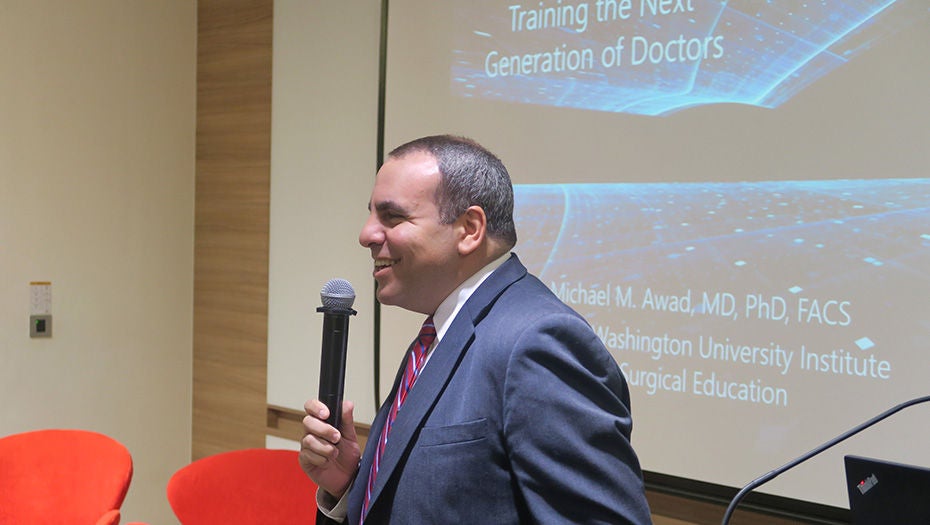
Assoc Prof Michael Awad giving a talk titled "Trends in the Future of Medical Education" during Academic Hour.
Medical education is set to see changes the world over. Assoc Prof Michael Awad from Washington University gives us a peek at what could be in store for us in Singapore, with these changes taking place at top-ranked Washington University: more personalised training and a rigorous residency programme to get all trainees up to speed with basic core competencies.
The medical education landscape today is vastly different from that just a decade ago. Twenty years ago, residents in the US were putting in 100-120 hours a week at hospitals. These long hours were talked about as a rite of passage for all young doctors.
Not anymore.
Medical education has been undergoing a reform in countries all over the world, starting with the US. This is partly in response to the burnout of young doctors who are exhausted from the long hours, but who also desire to deepen their areas of expertise in fellowship training in preparation of becoming consultants.
How has medical education changed in response to these?
Leading the charge in the reform of medical education are passionate doctors like Associate Professor Michael Awad, Integrated Surgical Disciplines Clerkship Director, Department of Surgery at the Washington University - one of the top-ranked medical schools in the world.
Assoc Prof Awad was in Singapore recently, and was invited to an Academic Hour talk to share on some of the more interesting changes currently taking place in the US medical education scene.
“Widespread changes across the board are reforming all areas of medical education, from resident work hours and lifestyle, to curriculum and the structure of surgical training, to training in research,” said Assoc Prof Awad. “Chief among which are the dramatic changes to residency education and the structure of medical and surgical training.”
Reforms to medical education systems around the world have been a long time coming – Singapore included. Top-ranked Washington University leads the way in the US, with more personalised training and a rigorous residency programme to get all trainees up to speed with basic core competencies.
Residency programmes to better prepare trainees for the job ahead
One recent initiative at Washington University to help trainees is an Intern Boot Camp, an intensive one-month programme for all internists at Washington University, who come from the 120 different medical schools across the US and Canada.
Assoc Prof Awad explained, “The camp aims to get everyone from the different backgrounds and training programmes on the same playing field, so that all internists start off with the minimum competencies met. At the end of the camp, students have to complete a round-robin assessment of technical skills, during which they have to perform technical competencies at 10 stations in total.”
Students also have to go through an individualised remediation and coaching programme known as Recursive Evaluation and Assessment of Cognitive and Technical Skills. This is to assess the areas they need to improve on and connect them with a personal teacher to help them work on the specific areas.
Another initiative that has shown fantastic results at Washington University is a public oral mock examination called the Advanced Certifying Examination Simulation (ACES). Residents benefit from the oral examination, as they are taught to sharpen their thought processes and examine their responses.
More flexibility in the structure of medical training to facilitate specialisation
The structure of medical training used to be a one-size-fits-all model, where students all did the same number of hours or rotations at each speciality.
However, residents at Washington University now have a customised training and rotation schedule depending on their initial interests. For example, students who are interested in General Surgery or GI Surgery will get more time with particular rotations, to hone their interests in the field.
While the American Board of Surgery has a certain requirement for the amount of time and the number of cases trainees have to meet, there is room for more flexibility within this framework. This has resulted in more satisfaction in their course of work.
Assoc Prof Awad, “Residents really appreciate having more flexibility in their medical training. Together with the cap in the number of hours that trainees can work a week, trainees have really benefitted from these initiatives that we have implemented at Washington – both in their personal well-being and in their career satisfaction.”













 Get it on Google Play
Get it on Google Play